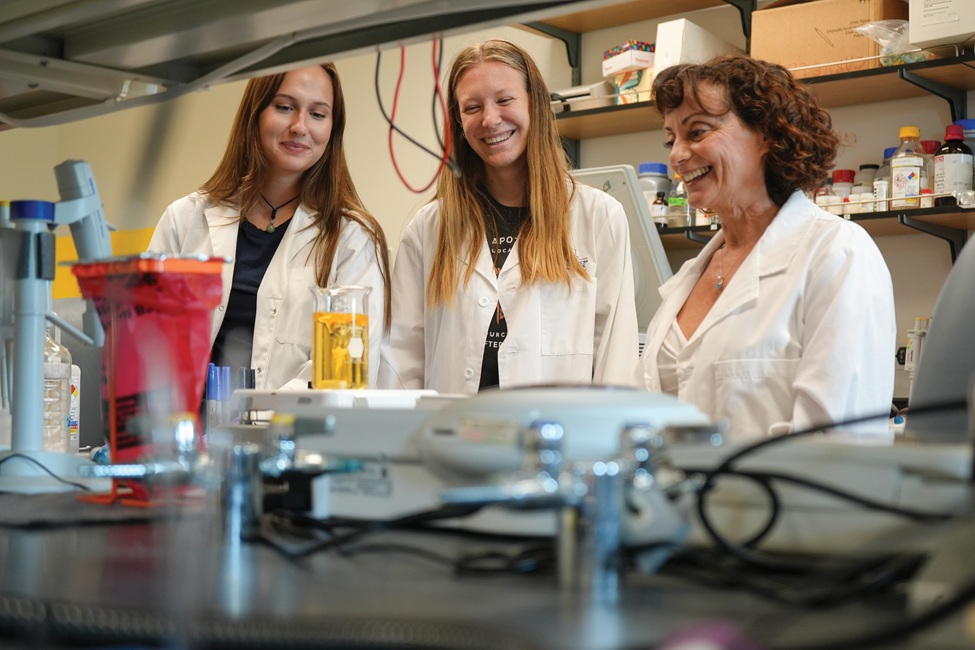FAU Receives NIH Grant to Investigate Amphetamine Addiction

(From left): FAU students Katie Poquette and Nicole Litvinchuk in the lab with Lucia Carvelli, Ph.D.
Lucia Carvelli, Ph.D., associate professor of neuroscience at Florida Atlantic University’s Harriet L. Wilkes Honors College and a member of the FAU Stiles-Nicholson Brain Institute, has received a $571,675 grant from the National Institutes of Health to advance critical research into how amphetamines affect brain function. Her work could pave the way for new therapies targeting substance use disorders and dopamine-related neurological conditions such as ADHD.
Amphetamine and its derivatives – including methamphetamine – are among the most widely abused drugs worldwide. In the United States alone, more than 32,000 deaths were attributed to amphetamine-involved overdoses in 2021. While Adderall is frequently prescribed to treat attention-deficit hyperactivity disorder, it also is misused, particularly by college students seeking cognitive enhancement. Excessive use can lead to serious side effects including insomnia, cardiovascular complications, addiction and even death.
This project represents a critical step forward in the fight against amphetamine misuse and its devastating consequences. Through a combination of innovative methodology, accessible model systems, and rigorous scientific inquiry, the research team is pushing the boundaries of addiction neuroscience while training the future leaders of the field.
“Despite decades of scientific investigation, major gaps remain in our understanding of amphetamine’s effects on the brain,” said Carvelli. “Existing studies have shown that amphetamines alter the dopaminergic system – an essential brain pathway that regulates reward and motivation – but the full range of molecular mechanisms remains unclear.”
Carvelli and her team will address this challenge by using a genetically tractable model organism: the microscopic roundworm Caenorhabditis elegans (C. elegans). With just 302 neurons, including eight dopaminergic neurons, C. elegans offers a simplified yet powerful system for dissecting the cellular pathways impacted by amphetamines.
In previous work, Carvelli’s lab discovered that amphetamine causes a dopamine-dependent behavior called Swip (swimming-induced paralysis) in which C. elegans – worms become immobilized when treated with a swim in a solution containing amphetamine. This behavior is triggered by an excess of dopamine in the synaptic space and has proven to be a reliable indicator of amphetamine’s effects at the neuronal level.
Building on these findings, the newly funded research will pursue two major objectives. First, Carvelli’s lab will identify novel regulators of dopamine release during amphetamine exposure. Using the Million Mutation Project – a genetic library of C. elegans strains with well-documented mutations – the team has already identified 10 strains that exhibit abnormal Swip behavior even without amphetamine exposure.
Interestingly, none of these strains carry mutations in known dopamine-related genes such as tyrosine hydroxylase, the dopamine transporter, the vesicular monoamine transporter, or the dopamine receptor DA2R. This suggests that previously unidentified genes may be playing a role in dopamine regulation. The team will perform detailed genetic and behavioral analyses to uncover these novel contributors.
The second goal is to identify genes that mediate amphetamine’s effects independently of the traditional dopamine release pathway. Preliminary results from the Carvelli lab have revealed a mutant strain that lacks Swip at baseline and fails to respond to amphetamine. Genetic sequencing of this strain uncovered a mutation in let-363, the C. elegans equivalent of the human mTOR gene – a known player in amphetamine signaling.
Using a combination of genetic knockouts, pharmacological inhibitors and behavioral assays, the research team will test whether let-363 and other similar genes are necessary for amphetamine-induced behaviors that bypass traditional dopamine release mechanisms.
By identifying genes and molecular pathways that either regulate dopamine release or act independently of it, Carvelli’s work opens the door to new therapeutic strategies for treating amphetamine addiction and other dopamine-related neurological disorders. Moreover, the study offers an invaluable training ground for FAU undergraduates, many from varied backgrounds, who will gain hands-on experience in cutting-edge neuroscience research.
“Our work will not only expand our understanding of how amphetamines affect the brain, but it will also uncover completely new biological targets that could lead to safer, more effective treatments for substance use disorders,” said Carvelli. “Equally important, we’re providing a meaningful research experience for undergraduate students, many of whom will become the next generation of neuroscientists.”
//
-FAU-
Latest News Desk
- FAU Receives $1.6M Gift for Student Entrepreneur ScholarshipsFlorida Atlantic University received a $1.6 million gift from long-time Boca Raton resident Bob Schattner, which will be used to continue providing scholarships that he established 15 years ago in perpetuity.
- FAU Lands $3M Federal Grant to Prevent Substance Use in At-risk Youth"Rising Strong" will support more than 3,000 South Florida youth with trauma-informed, evidence-based prevention, empowering vulnerable populations to build resilience and choose substance-free futures.
- FAU Research: Logistics Expansion Slows as Transportation Prices DropThe Logistics Managers' Index had the lowest overall reading since March as the supply chain reacts to economic uncertainty, according to researchers from Florida Atlantic University and four other schools.
- World's First Bench-to-Bedside MRI, Focused Ultrasound System UnveiledThe newly expanded FAU NeuroInnovate Center is the first in the world to integrate advanced MRI and focused ultrasound technologies into a single, unified platform for both preclinical and clinical research.
- FAU College of Business to Honor Craig ZinnFlorida Atlantic University's College of Business is hosting its 31st "Business Leader of the Year" breakfast to honor the accomplishments of Craig Zinn of Craig Zinn Automotive Group.
- Beyond the Pink Ribbon: Combating Breast Cancer in Younger WomenFAU researchers are investigating rising breast cancer in younger women. Four young survivors' stories highlight missed signs, emotional toll, and the urgent need for earlier detection and evidence-based care.






